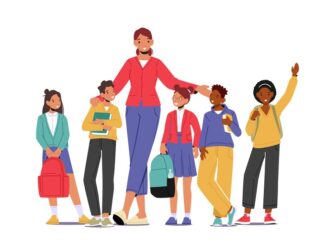As reported by The Guardian, Birchanger primary school warmly welcomed refugee children from diverse backgrounds, navigating challenges to foster an inclusive and supportive environment
When a hotel in the village of Birchanger started hosting refugees in 2022, a group of the fathers turned up at the local school one day and asked: “Can our children join?”
It was both an easy and a difficult decision for Birchanger Church of England primary school in Essex. The school sees itself as a welcoming space rooted in the community, yet staff feared that, like most schools, they would be left on their own to integrate the new pupils.
The intake of children from Kurdistan, Iran, Colombia, Azerbaijan, Russia, Ukraine and Afghanistan increased the school’s population by 12%, shifting it away from a monoculture, with new dietary and religious requirements to factor in.
“It quite quickly changed the dynamic of the school,” said the headteacher, Sharon Vessey.
“It was such a sudden increase in numbers, we had to look at the logistics of classrooms. We had to have another teacher to teach them [English]. It was unknown territory to us; we didn’t know how they were going to be, what they’d been through.”
Birchanger is one of many schools that have been suddenly tasked with supporting new asylum-seeker and refugee pupils with complex needs, including processing trauma and learning English from scratch, and found there is limited help.
The school encountered a lack of understanding from the local authority, from which the former headteacher “really battled” to secure funding for an English language teacher, while existing teachers spent an extra hour a day planning, Vessey recalled.
Desperately seeking support, one Birchanger teacher, Emma Walsh, found the International Rescue Committee (IRC) healing classrooms programme, which has sought to fill a gap in government resources by training more than 2,082 teachers in trauma-informed teaching and cultural awareness since launching in the UK two years ago.
“One of the difficulties is knowing, understanding, the nuances of different cultures,” she said, citing as an example how children from Ukraine regard sitting on the floor as a form of punishment.
Learning how to understand and support refugees with trauma was also a vital lesson, which enhanced the school’s existing emphasis on emotional wellbeing. Walsh said: “Lots of the training I did for trauma-informed practice benefits the whole school. If children haven’t yet experienced trauma, at some point in their life they will.”
Yet, she said, the asylum process means it can feel as though she is fighting an uphill battle. “We’ve had children who are in school in the morning; they and their family don’t know they’re moving, and by break time that child has already left.”
Maria Cristina Gil Barrera, who brought her two daughters over from Colombia to protect them from an unsafe situation, described the school as an “absolute blessing” that made her feel welcomed in the community. She was thrilled to watch her daughter go from speaking no English to attending a classmate’s birthday party.
Alesia Golubeva, who left Moscow after Russia invaded Ukraine, said her son David had been “shy about being a refugee, thinking that people don’t like him because he’s a stranger”, but 10 months later he loves school. She said she felt “so lucky” that he could study somewhere that helped him adjust, including to a different way of learning maths than in Russia.
From pupils teaching other children to count in Ukrainian to family members attending school parties wearing traditional dress, Vessey said she felt the extra effort was worth it. “They have been such an amazing addition to our school; they’ve really enriched our community. It opens up [the other children’s] eyes.”
Dame Maggie Aderin-Pocock, a scientist and TV presenter who is an ambassador for IRC, observed on a visit to the school that it had been “dropped in the middle of the ocean”.
She said she felt the asylum process made life unnecessarily difficult for families. “One parent said uncertainty is her biggest challenge, [it] makes it hard to plan ahead. When they were in Ukraine, or wherever, they could see that progression, but now that’s all been taken away.”
Josh Corlett, the IRC’s education manager for the UK, said the healing classrooms programme was rolled out in Britain to help schools cope with the arrival of refugees from Ukraine and Afghanistan.
“Many schools welcomed refugee students with very little notice or support, as we saw in Birchanger,” he said. “Most teachers we train voice that they struggle to find any training opportunities around working with refugee students and were often left concerned and anxious about the right approach to take. Teachers across the UK are regularly going above and beyond in the care and support they provide.”
He added that the role of schools was often overlooked, frequently representing “the only bit of normality and consistency” in refugee children’s lives, and offering “the best hope of overcoming any potential trauma”.
The IRC would like schools to have more knowledge and resources to reflect this, including compulsory trauma-informed training, English as an additional language training, and more funding for support staff.
Margaret Mulholland, a special educational needs and inclusion specialist at the Association of School and College Leaders, agreed there should be “more chances for schools to develop in-house expertise” around multilingualism, but that “for this to happen, the government needs to take meaningful steps to reduce workload and improve access to professional development opportunities”.





Be the first to comment